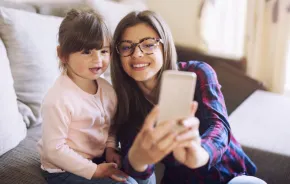 I was very excited about Diwali and the fact that it’s just around the corner. I was busy looking for events and get-togethers to celebrate Rama’s victory over Ravana.
I was very excited about Diwali and the fact that it’s just around the corner. I was busy looking for events and get-togethers to celebrate Rama’s victory over Ravana.
“You should come for this event!” I told a parent in my child’s school. “You’ll have a lot of fun.”
“It sounds interesting,” she said, and then cautiously added, “Are you Hindu?”
“Yes,” I said, equally cautiously.
“What about your daughter?”
That was a very strange question for me. By virtue of being born to us, two Hindus, my daughter is, by default, a Hindu. Or that’s what we think right now. We haven’t discussed religion in our house, because there hasn’t been a need to.
“Why do you ask?” I asked. “She’s also a Hindu, because we are.”
“So she wouldn’t have a choice?”
The question was very complicated. My husband and I are Hindus, but because we belong to different regions of the country, the way we worship, the reasons for our celebrations, the presentation, etc. — are all very different. Before marriage I was very strongly religious. I was God-fearing. I believed every action had a consequence, and out of fear of incurring the wrath of the Almighty, I prayed every day. I was taught, as a Brahmin, to pray religiously every day, to light the diya (lamps) and chant at sunrise and sunset (the most sacred times of the day).
I don’t anymore. My father doesn’t approve of my diminished devotion, but then he’s come to terms with it. He knows I believe in God, he knows that I try my best to teach DD all the mythological stories, and he’s happy she knows a few shlokas (religious prayers) and he knows that’s as good as it can get.
The topic of religion stirs a lot of strong emotions in me, especially because the city I grew up in, Hyderabad, was a hotbed for communal riots and religious clashes. Schools were shut down, buses burned, stones pelted, shops forced to close, all because of religious differences, because some Hindu said something demeaning to a Muslim or because some Muslim said something disparaging about a Hindu God. I remember being scared and asking my father incessant number of questions on why these things happened. Would people come to our house too and hurt us? I shuddered. My best friend in high school was a Muslim. Was I not supposed to be friends with her? It was very scary.
The independence of India is still considered bittersweet; it also led to the partition of the country to create a Muslim state — Pakistan. There are umpteen movies, books, shows, protests on the topic of religion in the subcontinent, of our tolerance and lack thereof. There have been many events of religious violence in India, before, during and after independence, and it is not limited to Hindus and Muslims. It involves Sikhs, Parsis, Jews, Christians. The topic of religion and caste is very volatile in the country, and a simple discussion could easily lead to a huge turmoil, an uprising.
I remember a particularly close encounter when I was in school. A riot broke out in the old city. All buses were canceled, and it was declared unsafe to go home. We didn’t have cell phones then, so we couldn’t contact our parents. My best friend, Fatima, and I held each other’s hands, close to tears. What is happening? I remember thinking. Am I not allowed to hold her hand? I could see the same question in Fatima’s eyes, but we held on tighter. It just didn’t feel right to let each other go.
The event luckily was contained, and eventually we could go home. My mother hugged me as soon as I reached her. There wasn’t any incident in our part of the city, but Amma couldn’t let me go. “Are you OK?” she kept asking.
“Amma … Fatima,” I tried. “She’s my best friend.”
“Yes. So?” Amma asked.
“Are these riots going to force us to break our friendship?” I asked, confused.
“Vasu, did you become friends with Fatima because she was a Muslim?” Amma asked.
“No. I became friends with her because she and I are very similar — in almost everything. She and I have the same tastes in clothes, food, books …”
“So religion was not a factor?”
“No! That never even crossed my mind.”
“Does her being a Muslim change who she is?”
“No.”
“Then don’t ever think you’ll have to choose friends based on religion.” Amma smacked me on the head. I hugged my mother and shivered. “It’s OK.” Amma hugged me back. “Everything will be alright.”
We’ve never discussed religion since. My daughter has asked us about God, and we’ve told her that each person can have a special name for God, some call him Allah, some Jesus, some Krishna. It’s just a name, you can call your God whatever you want. We’ve taught her to believe in God, for he will protect the good and destroy the bad — it’s just our attempt to reassure her that there’s someone there, constantly taking care of her, even if her parents are not around. But beyond that, it’s an open slate. DD can write what she wants on it, as long as it leads to a common good for her and the people around her.












